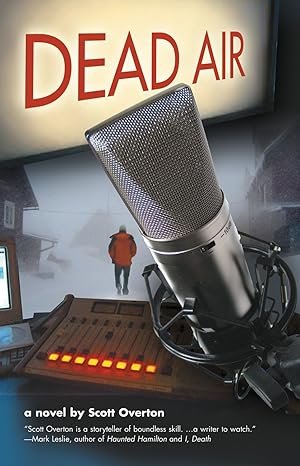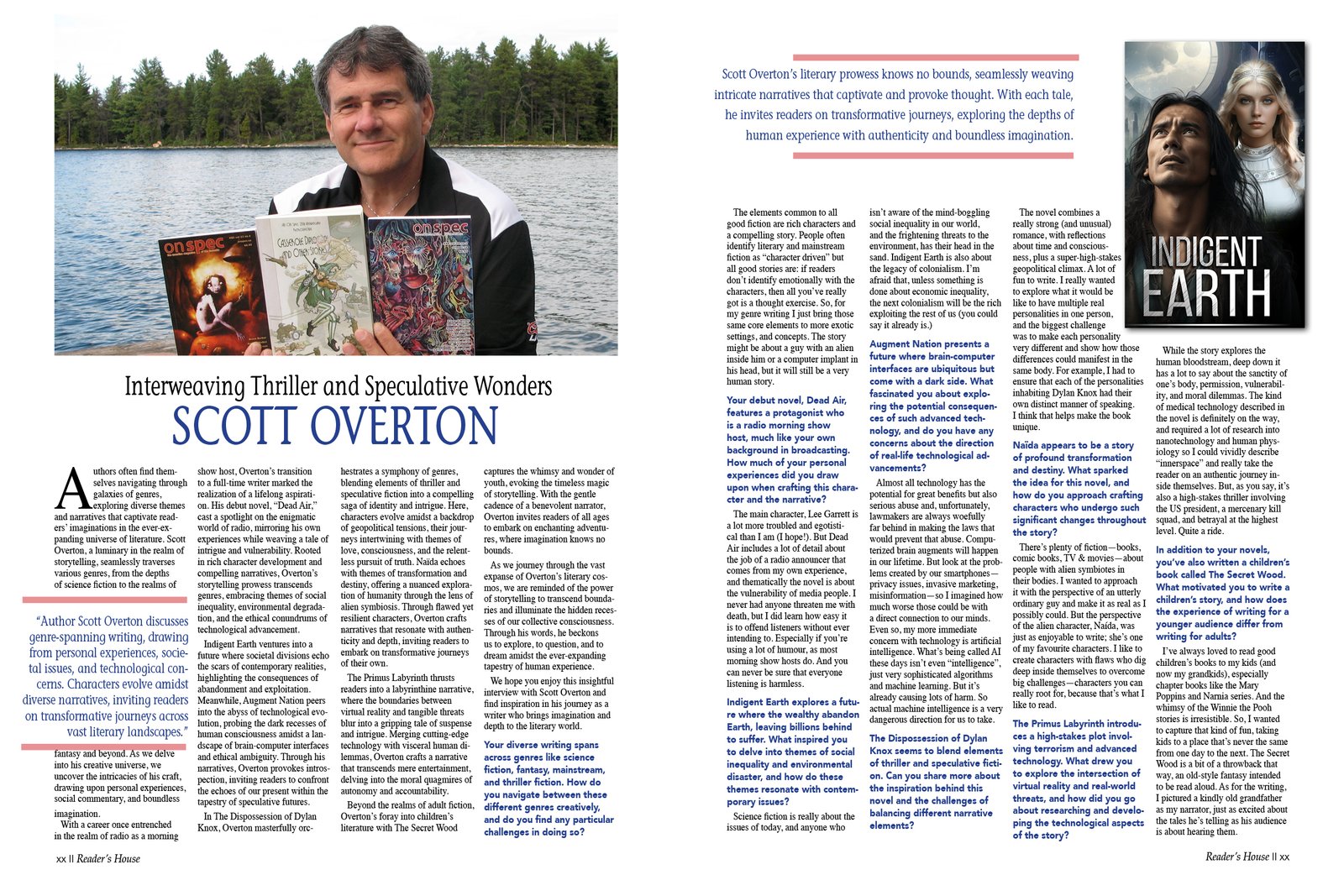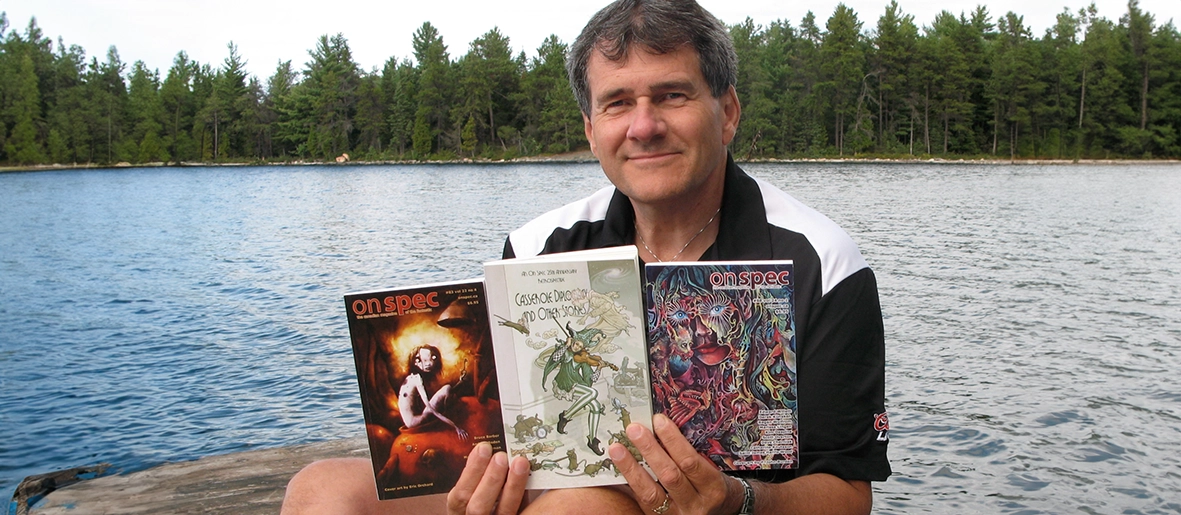“Author Scott Overton discusses genre-spanning writing, drawing from personal experiences, societal issues, and technological concerns. Characters evolve amidst diverse narratives, inviting readers on transformative journeys across vast literary landscapes.”
Authors often find themselves navigating through galaxies of genres, exploring diverse themes and narratives that captivate readers’ imaginations in the ever-expanding universe of literature. Scott Overton, a luminary in the realm of storytelling, seamlessly traverses various genres, from the depths of science fiction to the realms of fantasy and beyond. As we delve into his creative universe, we uncover the intricacies of his craft, drawing upon personal experiences, social commentary, and boundless imagination.
With a career once entrenched in the realm of radio as a morning show host, Overton’s transition to a full-time writer marked the realization of a lifelong aspiration. His debut novel, “Dead Air,” cast a spotlight on the enigmatic world of radio, mirroring his own experiences while weaving a tale of intrigue and vulnerability. Rooted in rich character development and compelling narratives, Overton’s storytelling prowess transcends genres, embracing themes of social inequality, environmental degradation, and the ethical conundrums of technological advancement.
Indigent Earth ventures into a future where societal divisions echo the scars of contemporary realities, highlighting the consequences of abandonment and exploitation. Meanwhile, Augment Nation peers into the abyss of technological evolution, probing the dark recesses of human consciousness amidst a landscape of brain-computer interfaces and ethical ambiguity. Through his narratives, Overton provokes introspection, inviting readers to confront the echoes of our present within the tapestry of speculative futures.
In The Dispossession of Dylan Knox, Overton masterfully orchestrates a symphony of genres, blending elements of thriller and speculative fiction into a compelling saga of identity and intrigue. Here, characters evolve amidst a backdrop of geopolitical tensions, their journeys intertwining with themes of love, consciousness, and the relentless pursuit of truth. Naïda echoes with themes of transformation and destiny, offering a nuanced exploration of humanity through the lens of alien symbiosis. Through flawed yet resilient characters, Overton crafts narratives that resonate with authenticity and depth, inviting readers to embark on transformative journeys of their own.
The Primus Labyrinth thrusts readers into a labyrinthine narrative, where the boundaries between virtual reality and tangible threats blur into a gripping tale of suspense and intrigue. Merging cutting-edge technology with visceral human dilemmas, Overton crafts a narrative that transcends mere entertainment, delving into the moral quagmires of autonomy and accountability.
Beyond the realms of adult fiction, Overton’s foray into children’s literature with The Secret Wood captures the whimsy and wonder of youth, evoking the timeless magic of storytelling. With the gentle cadence of a benevolent narrator, Overton invites readers of all ages to embark on enchanting adventures, where imagination knows no bounds.
As we journey through the vast expanse of Overton’s literary cosmos, we are reminded of the power of storytelling to transcend boundaries and illuminate the hidden recesses of our collective consciousness. Through his words, he beckons us to explore, to question, and to dream amidst the ever-expanding tapestry of human experience.
We hope you enjoy this insightful interview with Scott Overton and find inspiration in his journey as a writer who brings imagination and depth to the literary world.
Your diverse writing spans across genres like science fiction, fantasy, mainstream, and thriller fiction. How do you navigate between these different genres creatively, and do you find any particular challenges in doing so?
The elements common to all good fiction are rich characters and a compelling story. People often identify literary and mainstream fiction as “character driven” but all good stories are: if readers don’t identify emotionally with the characters, then all you’ve really got is a thought exercise. So, for my genre writing I just bring those same core elements to more exotic settings, and concepts. The story might be about a guy with an alien inside him or a computer implant in his head, but it will still be a very human story.
Your debut novel, Dead Air, features a protagonist who is a radio morning show host, much like your own background in broadcasting. How much of your personal experiences did you draw upon when crafting this character and the narrative?
The main character, Lee Garrett is a lot more troubled and egotistical than I am (I hope!). But Dead Air includes a lot of detail about the job of a radio announcer that comes from my own experience, and thematically the novel is about the vulnerability of media people. I never had anyone threaten me with death, but I did learn how easy it is to offend listeners without ever intending to. Especially if you’re using a lot of humour, as most morning show hosts do. And you can never be sure that everyone listening is harmless.
Indigent Earth explores a future where the wealthy abandon Earth, leaving billions behind to suffer. What inspired you to delve into themes of social inequality and environmental disaster, and how do these themes resonate with contemporary issues?
Science fiction is really about the issues of today, and anyone who isn’t aware of the mind-boggling social inequality in our world, and the frightening threats to the environment, has their head in the sand. Indigent Earth is also about the legacy of colonialism. I’m afraid that, unless something is done about economic inequality, the next colonialism will be the rich exploiting the rest of us (you could say it already is.)
Augment Nation presents a future where brain-computer interfaces are ubiquitous but come with a dark side. What fascinated you about exploring the potential consequences of such advanced technology, and do you have any concerns about the direction of real-life technological advancements?
Almost all technology has the potential for great benefits but also serious abuse and, unfortunately, lawmakers are always woefully far behind in making the laws that would prevent that abuse. Computerized brain augments will happen in our lifetime. But look at the problems created by our smartphones—privacy issues, invasive marketing, misinformation—so I imagined how much worse those could be with a direct connection to our minds. Even so, my more immediate concern with technology is artificial intelligence. What’s being called AI these days isn’t even “intelligence”, just very sophisticated algorithms and machine learning. But it’s already causing lots of harm. So actual machine intelligence is a very dangerous direction for us to take.
The Dispossession of Dylan Knox seems to blend elements of thriller and speculative fiction. Can you share more about the inspiration behind this novel and the challenges of balancing different narrative elements?
The novel combines a really strong (and unusual) romance, with reflections about time and consciousness, plus a super-high-stakes geopolitical climax. A lot of fun to write. I really wanted to explore what it would be like to have multiple real personalities in one person, and the biggest challenge was to make each personality very different and show how those differences could manifest in the same body. For example, I had to ensure that each of the personalities inhabiting Dylan Knox had their own distinct manner of speaking. I think that helps make the book unique.
Naïda appears to be a story of profound transformation and destiny. What sparked the idea for this novel, and how do you approach crafting characters who undergo such significant changes throughout the story?
There’s plenty of fiction—books, comic books, TV & movies—about people with alien symbiotes in their bodies. I wanted to approach it with the perspective of an utterly ordinary guy and make it as real as I possibly could. But the perspective of the alien character, Naída, was just as enjoyable to write; she’s one of my favourite characters. I like to create characters with flaws who dig deep inside themselves to overcome big challenges—characters you can really root for, because that’s what I like to read.
The Primus Labyrinth introduces a high-stakes plot involving terrorism and advanced technology. What drew you to explore the intersection of virtual reality and real-world threats, and how did you go about researching and developing the technological aspects of the story?
While the story explores the human bloodstream, deep down it has a lot to say about the sanctity of one’s body, permission, vulnerability, and moral dilemmas. The kind of medical technology described in the novel is definitely on the way, and required a lot of research into nanotechnology and human physiology so I could vividly describe “innerspace” and really take the reader on an authentic journey inside themselves. But, as you say, it’s also a high-stakes thriller involving the US president, a mercenary kill squad, and betrayal at the highest level. Quite a ride.
In addition to your novels, you’ve also written a children’s book called The Secret Wood. What motivated you to write a children’s story, and how does the experience of writing for a younger audience differ from writing for adults?
I’ve always loved to read good children’s books to my kids (and now my grandkids), especially chapter books like the Mary Poppins and Narnia series. And the whimsy of the Winnie the Pooh stories is irresistible. So, I wanted to capture that kind of fun, taking kids to a place that’s never the same from one day to the next. The Secret Wood is a bit of a throwback that way, an old-style fantasy intended to be read aloud. As for the writing, I pictured a kindly old grandfather as my narrator, just as excited about the tales he’s telling as his audience is about hearing them.
Follow the Author:
- Web: http://www.scottoverton.ca/
- Amazon Author page:https://www.amazon.com/stores/Scott%20Overton/author/B00E5OXNYM
- Goodreads Author page: https://www.goodreads.com/scottoverton
- Facebook: https://www.facebook.com/ScottOverton.author/
- X: @SFtruenorth
EDITOR’S CHOICE
“Dead Air is a riveting, expertly crafted thriller that captivates with authentic radio industry insights and relentless suspense. A must-read.”
Dead Air by Scott Overton delivers an engaging thriller that seamlessly combines the high-stakes world of radio broadcasting with a deeply personal story of survival. The protagonist, Lee Garrett, a morning radio host, faces an existential crisis when he discovers a death threat on his control console. Initially dismissing it as a prank, Garrett soon realizes the threat is real as minor harassments escalate into life-threatening attacks. Overton’s portrayal of Garrett’s unraveling life—marked by a failing career and a broken marriage—adds a layer of emotional depth to the suspenseful narrative.

PHOTO By Mike Dupont



